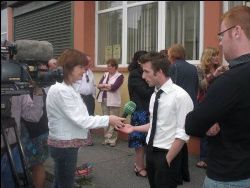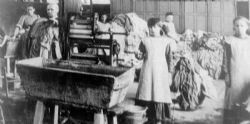By Michael Norby
The Irish Emigrant
September 29, 2009
http://www.irishemigrant.com/ie/go.asp?p=story&storyID=5217
 |
| Recognition: Filmmaker Steven O'Riordan, seen here being interviewed by RTE, has drawn wide media attention with his documentary The Forgotten Maggies. |
Forgotten Maggies to be premiered in New York October 1
After watching Peter Mullan's 2002 movie The Magdalene Sisters, young Irish store clerk Steven O’Riordan felt unsatisfied. He already had some knowledge of the plight of an estimated 30,000 women ripped from their families and held in forced servitude in 13 brutal Magdalene Laundries across Ireland. He also disagreed with Mullan’s portrayal of what happened after the women were released from the laundries.
“[Mullan] painted a picture that they all left and lived happily ever after,” O’Riordan told the Irish Emigrant. “That’s how I picked it up anyway.”
The laundries, also known as Magdalene Asylums, were first opened in the 18th century with the goal of “rehabilitating” misguided women. Those who fell into prostitution, or became pregnant or were badly behaved in the eyes of the ultra-conservative Irish society were prime candidates for detention.
Under the watchful eyes of nuns, the penance for these girls was forced labor in what were essentially commercial laundries. These “fallen women” were strongly discouraged from leaving and, deprived of even basic contact with the outside world, they became forgotten women.
This practice may not sound overly shocking for the 18th century but the final Magdalene Laundry closed its doors in Waterford just 13 years ago.
“These women couldn't watch a television, read a newspaper, read a book or have a conversation with someone from the outside world,” said O’Riordan. “That was happening as late as 1996.”
Ignored by society and media for all those years, it was only when the remains of 155 anonymous inmates where discovered by developers at a Dublin convent that the curious and damning eyes of the world gazed upon the the issue of the laundries.
Denied Justice
 |
| An estimated 30,000 women were forced to work in Magdalene Laundries across Ireland. |
O’Riordan, just 22-years-old at the time, decided to conduct his own research and what he uncovered was both shocking and inspiring. He developed a fuller, more stunning grasp of the shameful treatment these women endured inside the largely Catholic-run laundries.
More importantly, however, he also discovered that, branded largely as liars and gold-diggers, former captives and survivors were denied justice and left to fend for themselves once freed from the institutions. O’Riordan decided that he had to do something.
Unversed in any aspect of filmmaking, a determined O’Riordan realized that such a strong subject matter would trump his inexperience and he elected to make his own movie. He had the cutting and heart wrenching threads of an idea, but his efforts for support were unheeded initially.
He applied for grants and funding with the Irish Arts Council and other local authorities and, with each letter he sent, he received denials – his inexperience working frustratingly against him. Still, though, he battled on and with the haunting stories of thousands of silenced Irish women acting as petrol, he throttled up and decided to fund the project himself with whatever he could muster from his job at a supermarket.
Armed only with a mini Sony camcorder buckets full of tenacity, he went searching for material for his documentary.
“I discovered that no Irish person had ever documented what happened from an Irish point-of-view so I went off to do that,” he said. “Obviously I had to find [Magdalene] women to tell the story.”
Survivor
O’Riordan stumbled across an internet forum for survivors and connected with Maureen Sullivan, who was separated from her family at just 12 years of age and sent to live in an industrial school in Tipperary. During her time there, she was forced to work in a Magdalene Laundry where she endured hard labor and suffered years of mental and physical abuse instead of the primary education that she was promised.
“I told Maureen that I was doing a documentary and she began to tell me her story,” said O’Riordan. “She and I spent a further four months talking about her life, what she had struggled [through] and how she was fighting to become the first woman ever in the history of the Irish State to prove that the Magdalene Laundry, like the industrial schools, was state funded.”
Earlier attempts by Sullivan to secure justice proved to be fruitless. She had taken her case to the State’s redress board but was told that she was not entitled to any compensation because she could not prove that there was a definite link between the industrial school and the laundry. Sullivan also learned that a 1999 apology from then Taoiseach Bertie Ahern for victims of industrial school abuses did not extend to her.
Battle-worn from years of rejection - even her own solicitor eventually decided to throw in the towel and abandon her – Sullivan had nowhere to turn. Then, along came this young Corkman with a writing pad and a camcorder and a mission to rifle the story of the Magdalene Laundries to the forefront of the Irish conscience.
O’Riordan placed an advertisement on the website of the Irish Television Network and quickly secured the services of cameramen Seamus Hegerthy, 24, and editor Ger Boland, 19, both of whom offered their services for free.
“We had zero budgets, no facilities, little or no equipment and no professional guidance,” said O’Riordan. “We built a professional relationship on trust, friendship and an understanding of what we saw the end goal. [That was] having Maureen’s voice heard and telling a story that was compelling, unique and universal to a wider audience.”
And so began a three year process that would eventually become The Forgotten Maggies, O’Riordan’s powerful labor of love that has snowballed since it was first shown at this year’s Galway Film Fleadh. The film follows Sullivan and three other survivors; Kathleen Legg, Mary Collins and Mary King, as they struggle for their right to be recognized as victims of human rights abuses.
Frustrations
After he and Boland edited an initial 78 hours of footage into a documentary just over 90 minutes long, O’Riordan believed that, while not perhaps a technically polished product, he had produced a story as solid and as relevant than he ever could have hoped.
He keenly packaged the film and sent it away to the Galway Film Fleadh, sure that his work would be approved.
“I realized that we didn’t have it edited in a way that they would have liked,” he said. “We did the best we could and thought that maybe they would forgive our inexperience and take it on face value that the story was powerful enough.”
They were turned down. O’Riordan, his film crew and the women were devastated.
“I got really annoyed,” he said. “Three years of work but more importantly these women still didn’t have a voice.”
O’Riordan went to the office of the festival and refused to leave until they agreed to show the film. The organizers watched the movie again and decided to present the documentary at the Fleadh. The response was jaw-dropping. National news immediately picked up on it and further screenings brought standing ovations at sold out theatres up and down the country.
Now, after a whirlwind summer in Ireland, New York University’s Glucksman House is bringing O’Riordan to the United States for a premiere screening and discussion of The Forgotten Maggies on Thursday, October 1.
The unlikely triumph of a band of pre-novice filmmakers gels with the heartbreaking and ultimately inspiring story of the women they seek to give voice to. O’Riordan is just happy that the subject is now being discussed and is satisfied that he has played his part.
“I knew that I had stumbled across something extremely interesting,” said O’Riordan. “I just wanted to do it justice.”
The Forgotten Maggies will be screened on Thursday, October 1 at 7 p.m. at New YorkUniversity’s CantorFilm Center, 36 East 8th St., between Broadway and University Place in New York City. O’Riordan will be joined by Mari Steed, of Justice for Magdalenes, to discuss the origin and making of the documentary and the current effort to urge the Irish government to correct the omission of these women from the 2002 Redress Act. For further information visit www.irelandhouse.fas.nyu.edu.
Free admission to Members of Glucksman Ireland House and to all students/faculty with a valid NYU I.D. card. For non-members: $10 donation at the door for regular event series.
Any original material on these pages is copyright © BishopAccountability.org 2004. Reproduce freely with attribution.